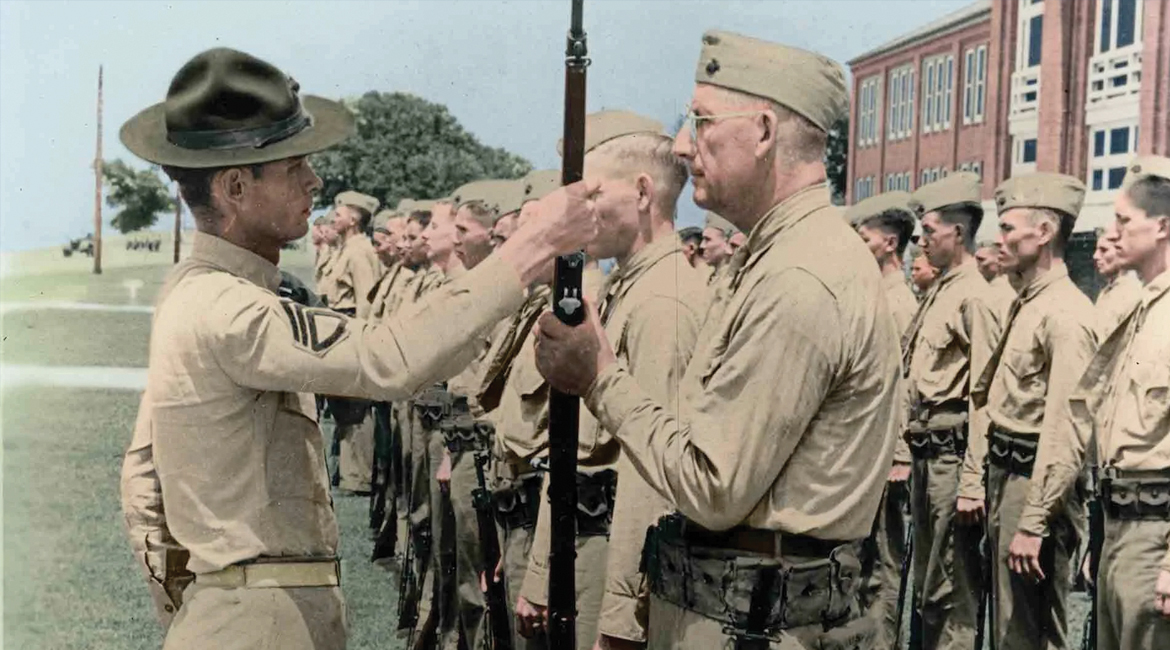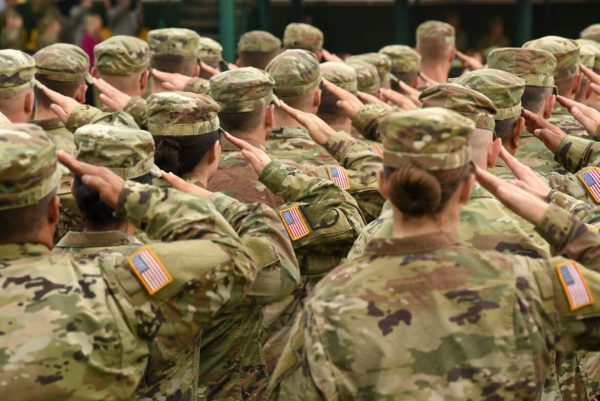Above: Pvt. Paul Douglas, age 50, performs a rifle inspection with his drill instructor aboard Marine Corps Recruit Depot S.C., 1942. Douglas, at age 50 was the oldest recruit in the history of Parris Island, and went on to become a Purple Heart recipient and Illinois senator. (Marine Corps photo).
A 50-year-old World War II Marine is overlooked no more.
A well-known friend in our industry, Bob Ingoglia—formerly vice president of corporate communication for Ricoh USA, now retired—recently sent me an article about a Marine named Paul Douglas. I pride myself on being fully aware of Marine history, and Ingoglia reminded me that there’s always more to know.
Matt Fratus, a history writer for Coffee or Die, authored the article. He has a reputation for finding unique stories that haven’t been covered. The original title of the article Ingoglia sent me is “The Marine Who Went to Parris Island At 50.”
Paul Douglas, the Early Years
Paul Douglas was born in Massachusetts on March 26, 1892, and raised in Maine. After graduating from Columbia University, where he earned a doctorate in economics, he joined the faculty of the University of Chicago as an economics professor in 1920. World War II began in 1939 when Germany invaded Poland. That same year, Douglas was elected a Chicago alderman. He tried moving up to being a state senator, but that did not work out.
The mere title of Fratus’s article still makes me shake my head in disbelief. As an officer candidate, I did my boot camp at Marine Corps Schools in Quantico, Virginia. We were told it is similar to the Marines’ experience at the Recruit Depot Parris Island. I was 21, fresh out of college, and in fair shape. It is hard for me to imagine how he—at 50 years of age—got through it.
Douglas wore glasses and had gray hair. As a 50-year-old, he was falling in with recruits as young as 17. Fratus underscored this age gap by highlighting that Douglas was one of the few people on the island born in the 19th century. On Parris Island, most people in their fifth decade and older were part of the training staff, particularly in the early years of the war, and had been in the Marine Corps during World War I.
Pvt. Paul Douglas was not looking for any special treatment and simply wanted the honor of bearing the title of U.S. Marine. Upon reading Fratus’s article, I questioned how a 50-year-old man was able to enlist. Turns out, he had some connections. His old friend Frank Knox was secretary of the U.S. Navy at the outbreak of the war. With that kind of endorsement, his enlistment was a done deal.
Paul Douglas’s Military Career
Upon completion of boot camp, Douglas was assigned the duty of writing training manuals. His goal was to become an infantry officer. In the Corps, that job requires having an 0302 MOS (military occupation specialty). After seven months as an enlisted Marine, Douglas was commissioned a captain. I would have to assume that he managed to get assigned to the 3rd Battalion 7th Marine Regiment 1st Marine Division due to his relationship with Knox. It was there that he proved his mettle as a Marine and earned the respect of those he served with.
Like all Marines in World War II, he spent his years fighting in the Pacific. He was unnoticed and unobtrusive. He was a gray-haired guy with a 45-caliber sidearm, which was standard for officers. Unlike the movies, no one wears symbols of rank in a theater of war. His fellow Marines were taken by his age. They had trouble believing he was one of them.
The story of Pvt. Douglas is an unbelievable one. You have the oldest recruit in the history of Marine basic training who earned multiple decorations at the Battle of Peleliu. He was assigned to the 3rd Battalion 7th Marines 1st Marine Division. This is the same division that had endured the battle of Guadalcanal. Veterans of both campaigns said it was a tossup as to which battle was worse. Guadalcanal was longer, but Peleliu had a higher casualty rate.
During the battle of Peleliu, Douglas made trips to the front lines to evacuate the wounded and dead. This detail is normally assigned to a unit known as Graves Registration. This unit also helped Navy Corpsman with the removal of the wounded from the battlefield.
Douglas was obviously close to the action and given this proximity, he realized the troops were in desperate need of more supplies for their flamethrowers and rocket launchers. He left the front lines to retrieve supplies while under small arms and mortar fire. His resupply efforts earned him a Bronze Star, along with a Purple Heart for a shrapnel wound. His heroics did not end there.
His next stop was Okinawa. During some heavy fighting, Douglas scrambled to assist in resupplying ammunition at the front lines. Pfc. Paul Ison from a demolition team saw Douglas lying on the ground with a bullet wound to his forearm.
Fratus noted in his article that Ison said, “If I live to be 100 years old, I will never forget this scene. There, lying on the ground, bleeding from his wound, was a white-haired Marine major. He had been hit by a machine gun bullet. Although he was in pain, he was calm, and I have never seen such dignity in a man. He was saying, ‘Leave me here. Get the young men out first. I have lived my life. Please let them live theirs.’”
His fellow Marines evacuated him, and Douglas spent 14 months in a hospital rehabilitating his wounded forearm. He retired and was never able to regain full control of his hand. Douglas was promoted to lieutenant colonel a year later. In 1949, he was elected to the U.S. Senate, where he served for 18 years. He died on September 24, 1976.
Thank You for Your Service Paul Douglas
What more can you say about a man who was wounded and asked to be left behind so that younger men might live? Paul Douglas exemplified the true spirit of the Marine Corps that took pride in never leaving a fellow warrior behind. The credo “I got your back” is never said, but it was always there. It still is.
As a Marine veteran, I thank Matt Fratus for writing such a wonderful article about a man who encompassed the finest qualities of our military and makes us proud that we wore the same uniform. And I thank Lieutenant Colonel Paul Douglas for his service and inspiration to our nation and for many generations to come, and for proving that age is simply a number.
Additional Sources about Paul Douglas:
- U.S. Department of Defense
- Wikipedia
- United States Marines University






